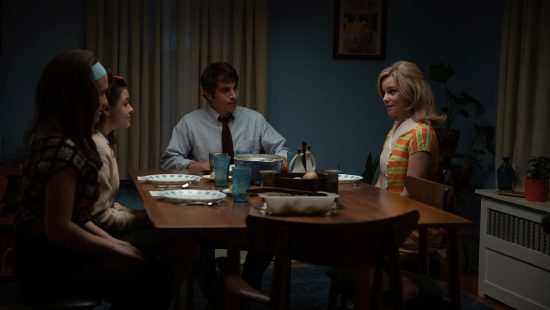Sundance 2022 Review: Call Jane – “One of the more accessible stories on this subject”

Elizabeth Banks, Chris Messina, Grace Edwards, and Bianca D’Ambrosio appear in Call Jane by Phyllis Nagy, an official selection of the Premieres section at the 2022 Sundance Film Festival. Courtesy of Sundance Institute | photo by Wilson Webb.
Roe v. Wade, a landmark decision that found a woman’s right to a safe and legal abortion constitutional in the United States occurred exactly 49 years ago today. January 22, 1973 things changed. But how does that saying go? The more things change…
Still today, a woman’s right to choose is front-page news, making headlines as certain States pass restrictions that make it nearly impossible for her to have any decisions about her own body. Inevitably, these decisions are made by a group of men – something that is shrewdly depicted in Phyllis Nagy‘s new film Call Jane.
In 1968 Chicago, Joy (Elizabeth Banks) and her criminal lawyer husband Will (Chris Messina) live in the suburbs with their 15 year old daughter Charlotte (Grace Edwards). Joy is as you would expect for the time, cooking dinner for her family, always looking polished no matter the day, enjoying the occasional gin and tonic on the front porch with her neighbour and friend Lana (Kate Mara). She also helps her husband with his law briefs. For as they say, ‘behind every successful man is a strong woman’ and Joy is exactly that.
Desperate for help, Joy calls a phone number she sees on the side of a mailbox for Jane. Little does she know that it links her to an entire clandestine group of women who call themselves The Janes, created by Virginia (Sigourney Weaver). These women provide a service to those in need. “We help women. We don’t ask questions,” Virginia says. Or at least they assist those that can afford it as member Gwen (Wunmi Mosaku) points out. It’s not a perfect system, and an illegal one, but it’s safer than anything else out there.
Director Phyllis Nagy, making her first foray behind the camera since the 2005 TV movie Mrs Harris, earned an Oscar nomination for the screenplay of the 2015 film Carol. The opening moments of this film especially emulate a similar aesthetic. Shot on 16mm film (Nagy says its more forgiving than digital) in 23 days and using just one camera, Call Jane always looks better than its numbers suggest. Nagy treats her subjects, especially those undergoing an abortion procedure, with compassion in their vulnerability. She never shies away from the procedure itself, careful to explain the steps, its instruments, its pain (mental and physical). Yet Nagy never loses sight that there is still a woman in that medical gown, terrified yet thankful, no matter their background or how they got there.
But while the story is compelling, angering and (unfortunately) timely there are parts to the script that are a bit clunky and not completely cohesive. There are a wonderful array of women introduced to us, yet some lack development. Mara’s character Lana remains an outlier, and a subplot involving her and Joy’s husband Will is unnecessary and frustrating.
It made me wonder if this film would have been even better as a limited series. This might allow more time to spend with the no-nonsense Virginia, played to wonderful effect by Weaver and especially the incredible Mosaku whose character Gwen doesn’t get near enough time to explore the impact (or lack thereof) of The Janes in the Black community. But whenever Call Jane wavers a bit, it is Elizabeth Banks’ welcome performance that anchors it and allows it to flourish. A rare dramatic turn for the actor that certainly makes you want more.
While Sundance doesn’t really program its festival based on theme, its submissions are obviously shaped by the world around us. As women today continue to fight this never-ending battle for their rights, not just to abortion but also to accessible health care, it’s not surprising that this is one film of three at Sundance bringing these issues to the forefront. The Venice Film Festival Golden Lion winner Happening screens tonight, while the documentary about the same group of women depicted in this film The Janes premieres on the 24th. Call Jane, while an imperfect film, may remain one of the more accessible stories on this subject for audiences, still relevant, still urgent, and certainly still worth exploring.










